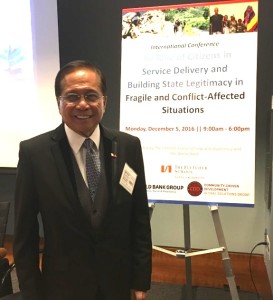PH peace adviser expresses optimism at World Bank confab in DC

Presidential Adviser on the Peace Process Jesus G. Dureza led the Philippine delegation to the International Conference on “The Role of Citizens in Service Delivery and Building State Legitimacy in Fragile and Conflict Affected Situations” Dec. 5-6. CONTRIBUTED
WASHINGTON, DC – Presidential peace process adviser Jesus G. Dureza is optimistic that the peace talks being held with rebel groups in the Philippines will be successful because he believes President Rodrigo R. Duterte has strong political will to attain peace.
Dureza, presidential adviser on the peace process, led the Philippine delegation to the International Conference on “The Role of Citizens in Service Delivery and Building State Legitimacy in Fragile and Conflict Affected Situations” organized by the World Bank and the Fletcher School of Law and Diplomacy Dec. 5-6 here in the US capital.
Experts from government, multilateral institutions, academia and non-governmental organizations (NGOs) discussed the link between service delivery and state legitimacy in fragile and conflict-affected areas.
According to the World Bank, over 60 percent of the world’s poor population will be found in countries dealing with conflict or areas experiencing issues of fragility.
In the Philippines’ case, areas in Mindanao have long been embroiled in insurgency and have the highest poverty levels in the country. Poverty in the region is almost twice the national average.
Dureza is serving his third stint as Presidential Adviser, having already served as peace adviser for two previous administrations, and is responsible for resuscitating the peace talks with communist rebels.
Already, two rounds of peace talks have already been completed in this Administration with the third round commencing in January 2017.
President Duterte has already declared a unilateral ceasefire of offense operations against the Communist Party of the Philippines-New People’s Army and also released 20 political prisoners based on humanitarian grounds to help facilitate the talks.
Dureza said the Administration hopes to attain peace with Communist-led rebels by the second year of Duterte’s term.
Referring to the Muslim separatist insurgency in Mindanao during his speech in a panel discussion, Dureza explained, “In our work in the peace process, it is very important that we address what we refer to as the ‘historical injustice’ that the Moro had suffered.”
Two separate peace agreements have been signed by two separatist factions, the Moro Islamic Liberation Front (MILF) and the Moro National Liberation Front (MNLF).
Furthermore, the two Houses of Congress have been developing their versions of the Bangsamoro Basic Law, the enabling piece of legislation that will give the Bangsamoro region greater autonomy.
But Dureza cautioned: “We feel that we can sign one hundred peace agreements, but if you do not include the lives of people, it will all go to naught.”
Apart from dealing with the peace agreements, the Office of the Presidential Adviser on the Peace Process (OPAPP) is also carrying out the implementation of development projects as the negotiations continue, which, as the Secretary noted, had not been done in previous peace arrangements.
The World Bank plays a role in development projects meant to enhance peace arrangements. It currently supports over 180 Community-Driven Development projects in 78 countries throughout the world, with a portfolio of almost $16 billion.

